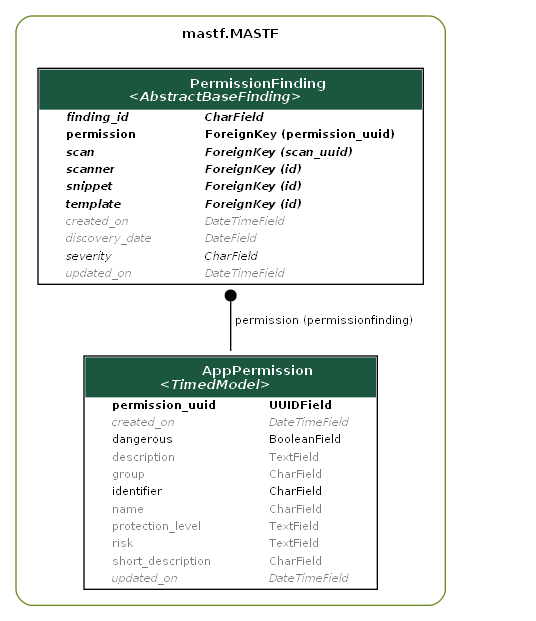App Permission Models
The following models should be used to add extracted permissions to an app. Each app
permission will be represented by an object of AppPermission which will then
be mapped to a PermissionFinding instance. With that model, we have to create
the app permissions only once and just have to mapp them to scans.

Figure 1: App-Permissions that can be created on the plugin page of each MAST-F instance will be mapped to a finding.
- class mastf.MASTF.models.AppPermission(*args, **kwargs)[source]
Represents an application permission with its related attributes.
- static create_unknown(identifier, protection_level) AppPermission[source]
Create an
AppPermissioninstance for an unknown permission.- Parameters:
identifier (str) – The string identifier of the permission.
protection_level (str) – The protection level of the permission.
- Returns:
An
AppPermissioninstance for the unknown permission.- Return type:
- dangerous
A flag indicating whether the permission is dangerous or not.
- description
A full description of the permission.
- group
The group to which the permission belongs. Can be null.
- identifier
The string identifier of the permission.
Hint
While Android permission identifiers start with something like
android.permission, Apple’s permission strings does not contain a package name. To emulate that, a custom package name will be added:!apple.permission.
- name
The name of the permission. Can be null.
- permission_uuid
The unique ID of the permission.
- property plevel_status: dict
Get a dictionary that maps the protection levels of the permission to their respective color codes.
- Returns:
A dictionary that maps the protection levels of the permission to their respective color codes.
- Return type:
dict
- protection_level
The protection level of the permission. Can be empty.
- risk
The risk associated with the permission. Can be empty.
- short_description
A short description of the permission. Can be empty.
- class mastf.MASTF.models.PermissionFinding(*args, **kwargs)[source]
The PermissionFinding class is a model class that represents a finding for a permission.
- discovery_date
Stores the date this vulnerability or finding was detected.
- finding_id
A unique identifier for the finding
- permission
A foreign key that associates a permission with a finding.
- scan
A foreign key that links the finding to a specific scan.
- scanner
The scanner that found the vulnerability or finding
- severity
The severity of the finding
- snippet
A foreign key that links the finding to a specific code snippet
- template
The finding template used to create the finding